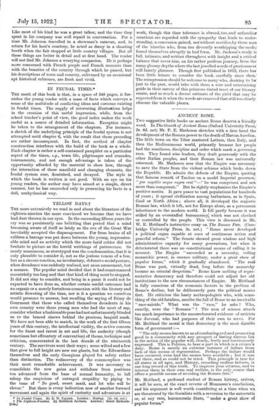YELLOW DAYS.t Trim more extensively we read in and about
the literature of the eighteen-nineties the more convinced we become that we have had dust thrown in our eyes. In the succeeding fifteen years the cry was so persistently one belittling that period that a mind becoming aware of itself so lately as the eve of the Great War inevitably accepted the disparagement. For from brains of all calibres a barrage was put down between the young, impression- able mind and an activity which the more lurid critics did not hesitate to picture as the horrid writhings of putrescence. So nearly unanimous, so sterotyped was the condemnation, that it is only plausible to consider it, not as the jealous venom of a few, but as a sincere reaction, an involuntary, defensive social posture, when decadence was suddenly realized, not as an amusement, but a menace. The popular mind decided that it had countenanced eccentricity too long and that that kind of thing must be stopped. It did not stay to consider, and being in a panic it could not be expected to have done so, whether certain sordid outcomes had an organic or a merely fortuitous connexion with the literary and artistic flowering of the time, nor is it a question we ourselves would presume to answer, but recalling the saying of Remy de Gourmont that those who called themselves decedents in his own country were those young men who had the most of sap, consider whether a fashionable pose had not unfortunately blinded us to the braced sinews behind the precious, languid mask. We have not been able to match, in the work of the first fifteen years of this century, the intellectual virility, the active concern for the finest and rarest in art and life, the audacity (though sometimes but effrontery of convention) of theme, technique and criticism, concentrated in the last decade of the nineteenth century. The survivors went their ways ; some wilted and a few that grew to full height are now our giants, but the Edwardians themselves and the early Georgians played for safety rather than distinction. The rediscovery of the commonplace was their most remarkable achievement. It was necessary to consolidate the new gains and withdraw from positions too advanced from the base of normal humanity, to lull asleep the suspicions of outraged stupidity by piping to the tune of " Be good, sweet maid, and let who will be clever." But there is every indication now of another forward movement and again the spirit of curiosity and adventure is at
• In Feudal Times. By B. H. Tappan. London : Harrap. 12e. 6d. net.] t The Eighteen-Nineties. By Holbrook Jackson. London: Grant Blebarda. 1.1564
work, though this time tolerance is abroad, too, and unfamiliar creations are regarded with the sympathy that leads to under- standing, a concession gained, not without sacrifice,by those men of the 'nineties who, from too devoutly worshipping the mode; found themselves abruptly in bad form. Mr. Jackson's study is full, intimate, and written throughout with insight and a critical balance that saves him, on his rather perilous journey, from the many gloomy depths where the last jewelled words of preciousness still faintly glimmer. Though first published in 1913, there has been little leisure to consider the book carefully since then.' The reimpression should be welcome to many who, desiring to be just to the past, would take with them a wise and entertaining guide in their survey of this primrose-tinted tract of our literary estate, and so reach a docent estimate of the yield that may be expected from it when the weeds are removed that still too closely obscure the valuable plants.


































 Previous page
Previous page